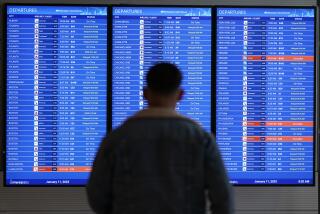Revenue Losses Hit Airport Operators
- Share via
U.S. airports and retail businesses clustered inside terminals are reporting dramatic revenue declines that threaten their economic viability, according to an airport industry report issued Tuesday.
U.S. airports lost an estimated $203 million in revenue during the weeks following Sept. 11 and risk losing $1.84 billion in the next 12 months, according to the Washington-based Airports Council International-North America.
The total economic effect at U.S. airports could hit $3 billion due to increased security expenses and cuts in federal funding due to fewer passengers, according to the ACI-NA. And, when coupled with a looming insurance crisis, some airports “may be forced to shut down critical operations,” ACI-NA President David Z. Plavin said Tuesday.
The airport sector’s financial woes are driven in part by reduced revenue from landing fees because airlines have cut schedules and announced layoffs totaling 100,000 employees. But airports are also reporting a significant drop in payments from parking lot operators, car rental counters and thousands of restaurants, retail shops, bars and other storefronts inside terminals.
Concessions operators could lose $850 million in revenue during the coming year, according to the ACI-NA, which surveyed airport operators Paradies Shops, HMS Host Corp. and CA One Services Inc. Concessionaires are “in the process” of laying off 9,600 employees, or a third of their work force, according to the airports council.
Storefronts in terminals are suffering a double hit. The number of passengers boarding flights is plunging, and those dropping off or picking up passengers are unable to enter newly restricted terminal space where restaurant and retail outlets are clustered.
Atlanta-based Paradies Shops, a closely held company that operates 300 shops at 57 airports, said business picked up slightly in recent days, but that overall sales remain down 35% to 40% compared with the first week in September.
“We’re going to do what it takes to survive,” Paradies President Dick Dickson said Tuesday. “But if you tell me this [concessions] business is going to remain down 40% through to the end of the year, we’ll all probably be out of business.”
Airports on Tuesday joined the growing line of travel and tourism businesses lobbying in Washington for federal assistance in the wake of the terrorist attacks.
“It is critical that Congress and the administration now focus on airports--whose problems and fate are inextricably tied with the airlines,” Plavin told members of the U.S. House of Representatives’ aviation subcommittee. “All the people who use and do business at airports each rely financially on revenues generated by passenger traffic, [so] fewer passengers means significantly reduced revenues for us all.”
In a related development, the heads of UAL Corp.’s United Airlines, Loews Hotels, Amtrak and 10 other travel-related concerns Tuesday used a closed-door meeting to urge Commerce Secretary Don Evans to reopen Washington’s Reagan National Airport and support federal tax incentives to encourage travel.
The ripple effect of the terrorist attacks first felt at airlines quickly spread to coffee shops, bookstores and bars that most airline travelers view as amenities. Along with parking lots and rental car counters, airport storefronts now are “an indispensable contributor to airport operations,” said ACI-NA Vice President Stephen Van Beek.
Airport operators are increasingly dependent upon payments from those concessions to pay day-to-day bills and finance long-term construction projects.
Domestic airports have $70 billion in cumulative debt that is financing runways, gates, terminal space and parking garages. The continued loss of landing fees and payments from concessionaires “would immediately jeopardize the ability of airports to operate and fund projects through debt service,” Plavin said.
Standard & Poor’s last week placed all North American airports on “credit watch,” noting “many airport ratings will clearly be more susceptible to the likely revenue and cost effects associated with large declines in passenger levels.”
Dickson, who last year was named chairman of the ACI-NA’s board, argued that the $15-billion federal bail-out of the airline industry doesn’t go far enough. “Someone has got to help the airports,” he said. “You can’t operate airlines without airports, and airports simply have to get relief.
“This is the toughest situation this industry has ever been in, no question,” Dickson said. “The numbers are staggering. Any time you get a double-digit decrease in a business with the tight margins our industry has and it’s catastrophic.”
Plavin asked Congress to help airports meet debt obligations by providing a federal guarantee to support airport bonds, providing a line of credit and three to six months of debt service to make up for revenue losses driven by decreased passenger levels.
*
Times staff writer Jube Shiver Jr. in Washington contributed to this report.
More to Read
Inside the business of entertainment
The Wide Shot brings you news, analysis and insights on everything from streaming wars to production — and what it all means for the future.
You may occasionally receive promotional content from the Los Angeles Times.










